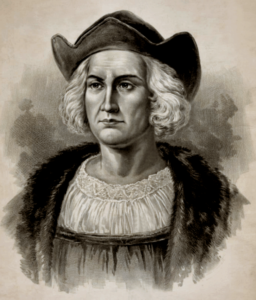Italian Explorer

Christopher Columbus was born in 1451 in the Republic of Genoa (now part of Italy) and died on May 20th, 1506 in Valladolid, Spain. Columbus was a master navigator and admiral whose four transatlantic voyages (1492–93, 1493–96, 1498–1500, and 1502–04) His arrival in the Caribbean islands brought about significant cultural exchanges, initiated European colonization, and had far-reaching consequences for indigenous populations.
Columbus sailed in search of a route to Cathay (China) and India to bring back gold and spices that were highly sought in Europe. His patrons, Ferdinand II and Isabella I of Spain, hoped that his success would bring them greater status. Trade was soon established between Europe and the Americas. Plants native to the Americas, such as potatoes, tomatoes and tobacco were imported to Europe. This trade route also paved the way for the slave trade between Europe, Africa, and the Americas. Explorers and settlers brought with them diseases that had a devastating effect on Native American populations. Many native peoples perished or were driven from their homes by colonizers.
While Columbus’s legacy is complex and controversial due to the consequences of European colonization, his voyages were undeniably transformative and had a lasting impact on the course of human history. Columbus’s bravery, navigational skills, and ambition made him one of the most renowned explorers of all time, and his expeditions ushered in an era of exploration, conquest, and globalization that shaped the modern world.